Archive
Would You Record In A Strange Place To Get Mood For Your Record?
 I’ve been doing work with the Nine Inch Nails multitracks lately and it got me to thinking about how Trent Reznor from NIN recorded “The Downward Spiral”. He said he tried out a lot of different places and he liked the house that Sharon Tate was murdered in. He ultimately recorded the record there as well as a few others.
I’ve been doing work with the Nine Inch Nails multitracks lately and it got me to thinking about how Trent Reznor from NIN recorded “The Downward Spiral”. He said he tried out a lot of different places and he liked the house that Sharon Tate was murdered in. He ultimately recorded the record there as well as a few others.
I know that sounds odd. And it got me to thinking if he hadn’t recorded it there, the record would’ve ended up completely different than it turned out. I know it made the mood of that record different from the earlier releases as well as the later ones. It was dark, scarry. But what can’t be denied is how good it sounded.
Whether you like rock/electronic music or not, it was recorded, mixed, mastered, and remastered really well.
This got me to thinking if room acoustics weren’t an issue, would you think about going to a location that would inspire a specific tone or mood for your record?
If I was making a childrens record, I might like to be in a day care’s off hours to set a mood. Or if I wanted something dark or somewhat spooky, I might do it at a house that was claimed to be haunted.
It can even go further than that. If you were doing a record that appealed to teens, would you record in a highschool at night? Maybe set up your gear around the desks?
Presonus Studio One
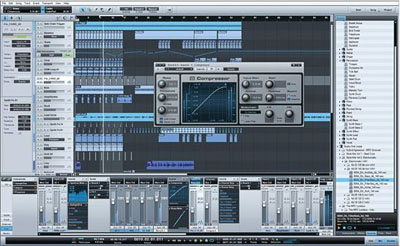 Presonus is about to release a music creation-editing-production software called Studio One. It isn’t available yet but you can download a free demo from their website.
Presonus is about to release a music creation-editing-production software called Studio One. It isn’t available yet but you can download a free demo from their website.
It has some stipulations to it though. It only works for 30 days, you can’t save, and you can’t import mp3 files.
But they say it’s good though. 🙂
Is anyone else getting tired of companies joining the “We’ve got a music creation-editing-production software available”? So how many is this now. Is anybody keeping count?
It has to be something revolutionary for people to change the software they’re comfortable with. My only question to the new software packages is “What are you doing different?” If your answer is “nothing”, you shouldn’t be wasting your time and money.
Mackie Working With Protools?
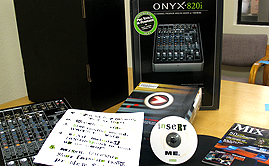 Mackie seems to have a firewire analog mixer that they’re about to release and it supposedly works with Protools M-Powered. I’m not sure how much Protools knows about this or if they’re in on this or not. Something tells me they are.
Mackie seems to have a firewire analog mixer that they’re about to release and it supposedly works with Protools M-Powered. I’m not sure how much Protools knows about this or if they’re in on this or not. Something tells me they are.
But just in case they’re not, I tip my hat off to you Mackie for fighting the power. Protools have been a little too protective of their hardware for far too long.
Maybe Protools is actually trying to see the light. Maybe they’re finally figuring out that this could be a nice boost to their bottom line in this terrible economy. Who knows?
But Mix Magazine has a report about this piece of mail from Mackie that’s a little gimicky if you asked me. When you get a chance, check it out.
Propellerhead Record Download
 Propellerhead has something good going with their Record software. If you’re at all familiar with Reason, it won’t take you long to get the hang of it. Honestly I really liked the software. I really liked it. Until I went to bounce.
Propellerhead has something good going with their Record software. If you’re at all familiar with Reason, it won’t take you long to get the hang of it. Honestly I really liked the software. I really liked it. Until I went to bounce.
Seriously Propellerhead, did you really have to disable that? What’s the logic? Because I sure can’t see it. It’s a boneheaded move on your part.
Here’s what you should have done:
1. Limited the beta testers instead of limiting what you can save and what you can’t.
2. You should’ve given your die hard fans (the very people who signed up for an invite) with something more since they actually are helping you with your own bottom line.
These people are doing something completely useful for you for absolutely no money whatsoever. You should’ve at least given them a way to test the whole thing.
You have good software. No denying that. But you guys need to start thinking long term.
How You Mix Tells A Lot About You
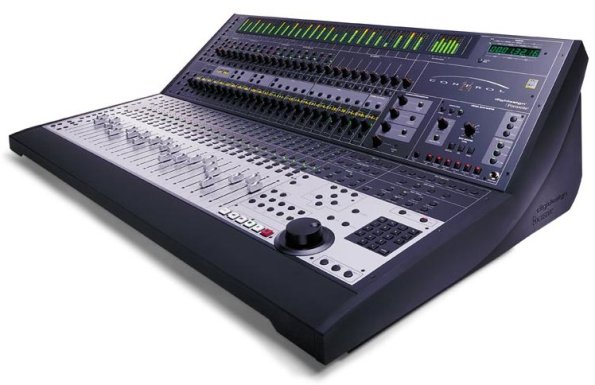 Since I’ve been getting a lot of new visitors to my new blog, I got my first question.
Since I’ve been getting a lot of new visitors to my new blog, I got my first question.
“How do you mix”.
I believe this to be a serious problem to everyone new to recording. It’s the hardest thing I’ve had to learn to do. I decided I’d make my answer in a post.
The way you do it may be different. But, I’ve had success with doing it like this. And that’s all I want to do in this post. To tell people having trouble with it the way I do it.
Ok.
Here we go:
Mixing is serious business. Often times you have to turn something awfully complex into something simple. It’s hard to come up with tips for mixing. I know there are reams of information on the internet about, but I wanted to take a stab at it.
What I’m about to write isn’t a tip. It’s more of the way I’ve been doing it with success. It doesn’t work in all situations, and I’ll tell you more about that in a minute. This is how I usually sit down and mix:
What’s important to remember is that “all faders love to go up”
– The most dominant track is the vocals in most cases so I start at the vocal. Nothing else. I go up as much as humanly possible.
– If there’s a lot of dynamics, I’ll compress.
– Once I’m satisfied with the vocal, I’ll start with the bass drum. Because it’s usually the bass drum that’s the second most important track.
– I usually mix the bass drum, snare, and bass guitar at the same time to get a feel for what I’m doing. Bass drum usually needs a little compression. And I pan it off center a little bit. Same with the bass guitar, accept I go the other way. So Bass Drum is a little to the left and the bass guitar is a little to the right. That usually gives both definition. If I’ve mic’ed right.
– Then I go to the next most important track. Sit that in the mix. All the way to the least important. It is usually there that I “sit on it a couple of days” and come back to it.
If it’s muddy or anything else, I fix it then.
Back to what I said about it not working in all situations: It’s rarely a perfect situation with a drummer that’s at home with recording. They usually tune their drums for live performances. Not good for you. You either tell them you need to tune the drums differently (good luck). Or you use triggers as best as you can.
If they don’t care about the quality of their recordings, maybe they shouldn’t be recording. So you are on the same side. You just have to let him/her know that it needs to be tuned different if they want to sound good. Even if they’re ok with sounding shitty, you aren’t. You have a rep to maintain.
For Guitars
What I’ve been doing is going direct out to the board and sending it to their amp. When I get ready to mix, I used to mic my amps and route it back to the board. I don’t do that much now. I usually just use a plugin since plugins have gotten really good lately.
I’ve never had a guitarist who actually wanted to sound shitty. So they’ll usually go along with you (myself included. I’m a guitar player.)
For Bass Guitars
For bass guitar, if they’ve done any recording in the past, they’re open to going direct. That’s great for you. Use a plugin. I used to use DI boxes, but I have a Focusrite preamp that I love for basses.
A lot of times keyboards get in the bass’s way. So I pan it wherever the bass isn’t panned.
For Keyboards
This is what I do for keyboards. Keyboardists have developed the sound they want. Most are very smart. I go direct to the board. Then, when mixdown comes, I send it out to the loudspeakers and have two small diaphragm condensers in the xy pattern and then I mix that with the direct signal. This usually helps “open” it up stereophonically.
After the mix
I know bands don’t like to wait for their mixes to be done. But what I like to do is when I have the main mix done, I like to “sit on it” for an additional few days. Let other people hear it through their listening environments and give me feed back.
If I just don’t have enough time to do that, I do the best I can with the main mix. There’s usually not much to change anyway. But a little more time does help the mix.
Tool Dependence – Which Tool Do You Use Most?
 Over the years, I’ve created hundreds of songs with my computers. And for the most part, I still have the multi track sessions. Thank God.
Over the years, I’ve created hundreds of songs with my computers. And for the most part, I still have the multi track sessions. Thank God.
I listen to a song I’ve been working on and think “the drums from song x would be great with this. I need to make a sample of those drums”. I can’t believe how much that happens with me. It seems like I’m loosing more and more creativity as I age. 🙂
So my tool dependence is obviously Propellerheads’ Recycle. To be such a simple program, I use it every single day. If it’s not me that needs it, it’s one of the hiphop acts I record that needs it. They’ll come in with these crazy drum loops in 135 bpm and want me to slow it down to 90 or something like that.
If you’re changing tempo on drum loops alot, Recycle is the perfect software. And with so many recording software packages that can read rex files (FL Studio, Logic, Protools, etc.), it makes it an obvious choice. Even if you’re using a software that doesn’t support it, it can help out a lot. You can export to wav files.
Nine Inch Nails Remixes – More Bands Should Do This
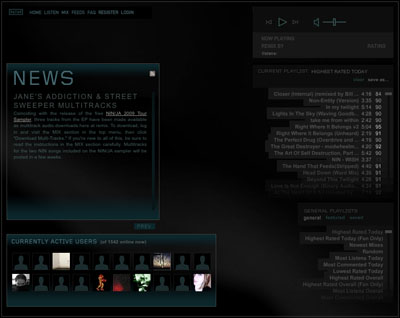 I’m a huge fan of Nine Inch Nails and when they released multitrack versions of some of their songs, I jumped on it. Seriously, every band should be doing this. It can only help with promotion. Anyway, I’ve been spending a lot of time lately making remixes of some of the songs they’re offering.
I’m a huge fan of Nine Inch Nails and when they released multitrack versions of some of their songs, I jumped on it. Seriously, every band should be doing this. It can only help with promotion. Anyway, I’ve been spending a lot of time lately making remixes of some of the songs they’re offering.
If you haven’t already, you can download the multitrack versions here: Nine Inch Nails Remixes
“God Given” is the track I’ve been working on. If you’re interested in knowing. 🙂
I have even more respect for Trent Reznor now that he’s done this. This one guy has done much for internet music, he doesn’t get the credit he diserves. Even if you’re just starting out, the professional quality multitracks are something I wish I had when I was starting.
These have been out for quite some time, but I just wanted to say something about it since I’ve been revisiting the mixes. If you haven’t already, you need to download those.
How To Get A Good Recording From The Most Relentless Musicians
 Back when I was starting, I would record bands for free. I still do that sometimes, but I would always make their recordings sound the way they wanted it to sound.
Back when I was starting, I would record bands for free. I still do that sometimes, but I would always make their recordings sound the way they wanted it to sound.
Over the last few years, I’ve found this to be a double edge sward.
Some of the newer bands that come to me tell me in conversation that they almost didn’t want to work with me because what they heard from other bands was bad. Then, they hear a recording of someone else and they liked that one, so they wanted to try me out.
Can you see how bad this is for you?
You really want your clients to feel good about their recordings, but at the cost of the quality of the recording?
The only way I’ve been able to do this is to tell them up front that I’m a producer first. If they want someone to just hit the record button for them, they need to go somewhere else. There’s a song that I’ve been using for the last couple of months to help explain this…
Iris by the Googoo Dolls
They released the first demo of the song recently on “Goo Goo Dolls Greatest Hits Volume 2” and it totally sucked. It was boring, it had no dynamics. It basically had nothing. It sounded like a high school garage band making fun of the song or something.
Then I put in the CD of the album version, and they’re amazed by how much better it sounds than the first demo. The arrangement changed a little, but the feel of the song changed a lot. It became a hit.
This usually gets them to consider maybe a fresh set of ears is actually worth something.
Then I tell them, after we’re done, take the mix home and listen to it for a couple of weeks, and if they still don’t like it, I will record the song the way they want for free.
This gets them to want to try my way. Musicians are a fairly picky bunch, but you really have to let them know that you want the best for them and their music. After they get a taste of what you can really do, they refer their friends to you and you develop a relationship with a whole other group of people. And sometimes a completely different style of music that you wouldn’t be able to record otherwise.
The only downside to this is you won’t get as many people wanting you to work with them. But you usually get the best of them. And it does start slowly, but you find yourself taking in clients from many miles away just to work with you. And that’s a damn good feeling.
When Did You Know You Wanted To Record And Mix?
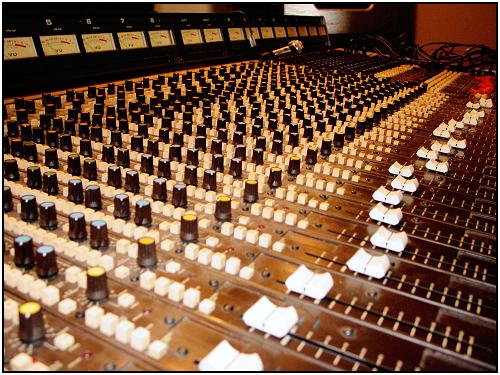 This is a good question. I’d like to know what you think because I know how it was for me. Are we all musicians? I know I was. I got tired of paying for crappy mixes. They told me and my bandmates: “You want to mix on a different day then you record”. I hated that. But the fact of the matter is it was true. As much as I hated it at the time. When I started recording other people I figured a way around it, I’d give them a “demo mix” to bring home and give me some suggestions.
This is a good question. I’d like to know what you think because I know how it was for me. Are we all musicians? I know I was. I got tired of paying for crappy mixes. They told me and my bandmates: “You want to mix on a different day then you record”. I hated that. But the fact of the matter is it was true. As much as I hated it at the time. When I started recording other people I figured a way around it, I’d give them a “demo mix” to bring home and give me some suggestions.
I know when I was going to other studios I didn’t want to hear that, because there were deadlines, either the industry wanted a finish product or the club did. And having to wait extra days appealed to me about 0 from 100 percent.
That’s when I decided the only thing to do was to build a studio for us. We were doing soundtracks that “could have” made some good exposure. We weren’t in Taxi at that time. So coming across oppertunities like that were rare. So rare that we got off our butts and started working.
Clubs always want to hear you before they hire you. You’ll find that out as you go along. But also, People will want to hear you before they want anything to do with you too.
The only recommendation? Record all the time.
That could be hard and it could be easy. You could become a part of the DAW generation, or you can let everybody else control what you do when you do it and for how much money.
We chose to have control.
We started noticing something. We started to sound like shit. I mean, worse than we ever have. Could it be a different engineer? Of course, it was me. And at the time I put out shitty work.
It’s no wonder we didn’t get on any of the “cool soundtracks” (as of right now, we’re still not in Taxi).
Eventually, we started sounding good. And that was only because I read alot about recording and mixing, and screwing up everybody else’s mixes, including my own.
After about six months, I started to actually turn out good mixes. I learned the hard way. It is only by sucking for so long that you can come up with a good mix.
In The Studio With Michael Jackson
 If you haven’t seen the peice on Bruce Swedien in Mix Magazine yet, you should really check it out. In the interview, he shares a couple of stories about Quincy Jones.
If you haven’t seen the peice on Bruce Swedien in Mix Magazine yet, you should really check it out. In the interview, he shares a couple of stories about Quincy Jones.
He also talks about his upcoming book “In The Studio With Michael Jackson”. Here’s one quote from the interview:
“Though the book was in production for many years we did not anticipate its release coinciding with the events of the last few weeks,” states Aaron Lefkove of Hal Leonard Books. “As engineer, Swedien was, along with producer Quincy Jones, one of the creative partners and architects of Jackson’s sound. The book is part anecdotal memoir, part technical reference, and paints a vivid portrayal of Michael Jackson as an artist.”